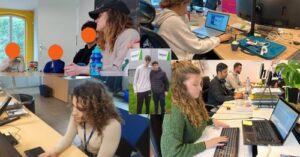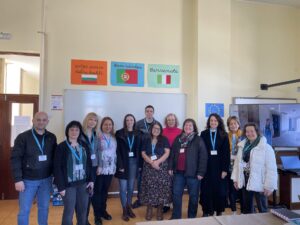Like elsewhere in the world the situation in Bulgaria is dynamic due to the unprecedented COVID-19 pandemic. Bulgaria is one of the countries that introduced a strategic set of measures for limiting the coronavirus spread as soon as the first cases occurred in early March. The state emergency committee actively seeks and analyses good practices that worked around the world, transfers and adapts them for the national context. Every few days new or stricter measures are introduced.
All schools and kindergartens in the country are closed since 13th March in hopes of mitigating the spread of the coronavirus disease. Each school had the liberty to organize their distance learning process individually considering the available resources. Most schools have already used the support of different electronic platforms for synchronous and asynchronous learning most popular among which are: Shkolo – 1271 schools use the platform; Ucha.se – has more than 16 000 video lessons; Оffiсе 365 from Microsoft and G Suite from Google.
The Ministry of Education has created more than 865 000 profiles of all students and teachers in Miсrоsft Tеаms in order to facilitate the online learning process. The Ministry has also created a National electronic library for teachers available at: e-learn.mon.bg.
The Library is organized as a repository of resources for e-learning such as author’s educational, didactic and methodological materials for working in electronic environment – video tutorials, training programs, innovative methodologies, tests, short films, exercises, entertaining pedagogy, presentations and especially projects related to self-study in the electronic environment. All shared materials should correspond to the national educational standards and curricula.
Two of the biggest publishing houses in the country announced that they would guarantee free access the electronic version of all textbooks they published for the grades 1-10. Electronic diaries, e-mails, social media are also used in order to provide students with instructions how to better prepare their self-learning activities and homework exercises. The school directors have the task to analyze the adapted for electronic education school programme and make sure that the workload for students from 1-7th grade is up to 6 hours per day and for 8-12 grades up to 7 hours per day (part of these hours are not spent in the electronic environment). Additional learning resources should be foreseen outside the planned lessons time.
The distance learning in Bulgaria will continue at least by 13 April 2020. For the moment, although students perform tests they do not receive formal grades. Teachers are collecting data on the level of involvement and active participation of students, which may be used later in the formation of the final grades for the school year.
The role of the parents in the current situation is crucial. They should constantly keep in touch with the teachers; follow their instructions to the students and oversee their proper fulfilment. Parents should provide all essential conditions for productive e-learning environment: ensure a quiet place, equip the students with necessary technical devices such as tablet/laptop, headphones, microphone, good internet connection, etc. and should supervise their usage.





